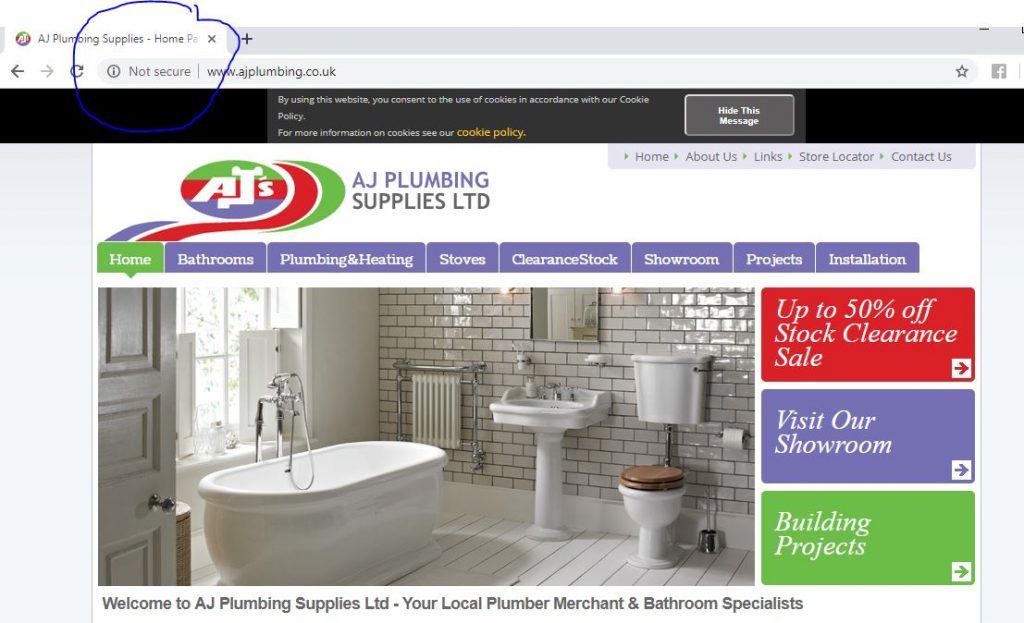
Basic Search Engine Ranking Factors
2nd November 2020Known Basic Search Engine Ranking Factors
There is a lot to matching the algorithms to
Secured Sites HTTPS
You will notice that there are two address options at the beginning of the URL when you visit a website HTTP:// and HTTPS:// The latter denotes an extra layer of security comprising known as Hypertext Transport Protocol Security This extra layer includes the SSL 2048-bit key and can protect a site connection through authentication and encryption. When installed on a web server, an SSL certificate activates the padlock and the https protocol and allows secure connections from a web server to a browser.
Secure websites protect your connection by securing information in three layers:
- Encryption ensures that a user’s activity cannot be tracked or their information
stolen . - Data integrity prevents files from being corrupted as they are being transferred
- And authentication protects against attacks and builds user trust
But do SSL certificates affect search engine rankings?
Can HTTPS improve your Search Engine Ranking?

Rankings
In 2014, Google updated algorithms across the board in favour of HTTPS websites. Then, it was not too important within the overall ranking algorithm and HTTPS sites experienced only minor ranking increases. But Google indicated that its effect would increase in future
In 2015, Google stated that their HTTPS ranking boost may serve as a tie breaker if the quality signals for two different search results are equal in everything else. Meaning, if your website is equal to your competitor’s website in terms of speed, title tags, content freshness, etc. but your competitor’s website is HTTPS and yours isn’t, Google will most likely rank theirs ahead of yours.
As of 2019 31% of websites are now using HTTPS and nearly 50% of Google’s search results diplay as secure.
Google has encouraged webmasters to make the migration to a secure site for a while now and has been giving an increasing amount of weight in ranking boosts to websites that are HTTPS.
Traffic
Better rankings can lead to more traffic. Also, when users are looking at the search results, they may see a secure site as a signal of trust and authority and click that website over another, non-secure site, thus improving your site’s click-through-rate.
Conversions
It is highly probable that users trust secure connections more.
According to a GlobalSign survey, 84% of users would abandon a purchase if data was sent over an insecure connection, and a significant majority are concerned about their data being intercepted or misused online.
Chrome is now Labelling Sites as Not Secure
Search for a site on Chrome and you will now see this displayed. Guaranteed to put any concerned buyer off.
This is how your site will appear if you are not secure.

Be Proactive & Act Now: Get Your Website Secured
There is no doubt that Google rankings are now significantly affected if your site does not show as HTTPS://. So, get your security certificate now and improve your ranking today
Contact us for details
Mobile Friendly Sites
Mobile-first indexing means Google will predominantly use the mobile version of the content for indexing and ranking. Historically, the index primarily used the desktop version of a page’s content when evaluating the relevance of a page to a user’s query. Since the majority of users now access Google via a mobile device, the index will primarily use the mobile version of a page’s content going forward.
It is essential from hereon in that websites offer a mobile version of their website, otherwise going forward your search rankings will be seriously affected
Schema Mark-up
What Is Schema.org?
For website owners who are non-technical I will try and translate this important new element for improving your ranking on Google and other search engines.
In simple terms schemas provide the search engines with information about your website, products and services in a format which matches their spidering requirements.
Search engines including Bing, Google, and Yahoo! rely on this mark-up to improve the display of search results, making it easier for people to find the right web pages.
Can Schema Mark-up Help My Website Rank?
We believe so. According to Webmaster Tools, “rich snippets can make your web pages appear more prominently in search results, so you may see an increase in traffic.”
Which Applications Should I Use Schema.org For?
There are many ways to use schema mark-up on your website: We use WordPress for most of our client’s websites and we use a WP plug-in to create search engine snippets which comply with schema.org ‘s format.
- Video pages (Google recommends the use of rich snippets on a unique video landing page, even if the video is an embedded YouTube)
- NAP information (make sure your business’ geographic and contact information is listed correctly—Contact us find out how your business can show up advantageously on Local Searches))
- Testimonials (the majority of consumers trust online reviews, so make sure you have testimonials displayed prominently)
- Events (gets your event on the search engines more efficiently)
Quality of Content
There is no longer an easy way to gain great visibility, it requires hard work and great content. Websites who just list products through Woo Commerce, Shopify or suchlike are losing out.
Google
In the early years, search engines relied mostly on keyword density to gauge the relevancy of a web page. So smart Internet Marketers used to stuff keywords throughout a page even resorting to white on white replication of keywords (You couldn’t see them, but they were there.) But those days are gone; Google will
How Search works in relation to Content
For a typical query, there are thousands, even millions, of
web pages with potentially relevant information.
So, how does Google figure out what to show in your search results? Well, the
journey starts before you even type your search…
Crawling and indexing
Google uses web crawlers to organise information from web pages and other publicly available content in the Search index. These WebCrawler’s known as spiders are basically low-level AI which read your page and through its experience database decides on where to put your page in the index. (Are you understanding the value of content yet?)
Search algorithms
Google ranking systems then sort through hundreds of billions of web pages in the Search index to give you useful and relevant results in a fraction of a second.
Size of Content
As the search engine spiders are basically dumb, the words you use in your content are key to helping this dumb spider understand what your page is all about.
The rule of thumb is your article needs to be long enough without being too long. In other words, it needs to contain enough clues for Google to be able to make a decision. The latest information is that pages with at least 900 words would seem to rank higher.
According to expert Neil Patel
“The average content length for a web page that ranks in the top 10 results for any keyword on Google has at least 2,000 words. The higher up you go on the search listings page, the more content each web page has.”
As a rider, it would appear that the length of a post has no relation to conversion.
Social Media

Will a Social media presence improve your overall rankings? Answer: They don’t have a direct impact of your ranking….but with a social media presence you can
- Increase online visibility and traffic to your website
- Improve your brand recognition
- Give your content a longer lifespan
And it definitely works for local SEO
So, your decision is “Do I really need a Social presence for my business”
We can help you make that decision. Please call us 01606 631044 for an informal chat.
Backlinks
Inbound and outbound links are important ranking factors for SEO however, linking needs to be done with care to ensure you don’t negatively affect your company’s online reputation.
Additionally, ensure that all pages on the site can be reached by a link from another findable page. The referring link should include either text or, for images, an alt attribute, that is relevant to the target page.
Why it works
Backlinks improve user trust particularly if you link to a business-related site. Backlinks also improve your authority score from the search engine’s perspective. This is why organisations like Amazon and eBay always show at the top of a search.
Images
The key here is to
Cramming your website with beautiful heavyweight images is a sure-fire way to reduce the possibility of
Here’s what you need to do.
- Reduce the File size: Load time is critical for ranking so skinning your images is the first thing you need to address. This can be done using a variety of products including Photoshop and Paint Shop Pro.
- File name: use a descriptive title. This will assist the search to identify where you should in their index.
- Alt tag: The alt tag of an image is alternative information (for those who cannot see the images in their browser) and to help search engines understand what the image is about. It is a way to describe the photo for the search engines. When you do an image search for “iPhone,” the images that show up have “iPhone in the alt tag and probably in the image title as well.
- Title: Always title your image. Make it concise and catchy.
Domain Age
This is where Latent Semantic Indexing keywords come into play. We will be covering this topic in more detail in a future post, but for now check out—”How Search Works”— that sheds light on LSI keywords:
Make sure you use authority links to back up your information. If you need help on article construction, please call us on 01606 631044.






